RATE SHOCK

How are housebuilders, estate agents and property firms coping?












Asset Value Investors (AVI) has been finding compelling opportunities in Japan for over three decades. Despite a year filled with challenges and volatility, Japanese equities fared relatively well.
Many investors may be surprised to hear of Japan’s resilience during what was a difficult year for global equity markets. After all, Japan has suffered from stagnant growth and an ageing population for a prolonged period of time. However, Japan has a relatively stable economy and the attitude towards corporate governance has improved significantly since the onset of ‘Abenomics’. Japan is now the world’s second largest activist market. Activist events have risen 110%* over five years, as pressure from shareholders continued to intensify. This was accompanied by a surge in corporate buybacks as cash was returned to investors.
Excess cash is one of the things that the investment team at Asset Value Investors (AVI) look for in Japan. AVI’s portfolio of 20-25 stocks are all companies that have been thoroughly examined by the investment team to find value, quality, and an event to realise the upside. Key to the strategy is to build relationships with company management, actively working together to improve shareholder value. While AVI can launch public campaigns, it aims to work behind closed doors with management to find mu-
tually beneficial solutions. The depth of the investment team provides AVI the resources to undertake detailed and targeted research.
In 2022, our engagement was mostly behind the scenes. Over 120 meetings were held with 26 portfolio companies and 24 detailed letters or presentations were sent to these companies. This engagement is well supported by the broader changes in the attitudes of Japanese management as they are encouraged by the Japanese Corporate Governance Code to better allocate capital. The result is long term sustainable improvements in returns for investors.
As anyone who has invested in Japan will know, change takes time. Discovering overlooked and under researched investment opportunities requires a long-term approach. A long-term time horizon aligns AVI with the interests of the management to work together on creating shareholder value.

The companies AVI invests in have cash on their balance sheets and attractive business models with either stable earnings or structural growth trends to ensure corporate value is growing.
In 2018, AVI launched the now c. £149m* AVI Japan Opportunity Trust (AJOT). The strategy’s first four years bears witness to the success of this approach, with a strong NAV total return and outperformance of its Japan small-cap benchmark. AVI’s aim is to be a constructive, stable partner and to bring our expertise – garnered over three decades of investing in Japan. We are optimistic about the macro environment in Japan. The weak Yen makes Japan highly cost-competitive, both for
tourism and manufacturing. Our portfolio includes a variety of sectors, with strong exposure to the domestic Japanese economy. Inflation has returned after a 40-year absence and with wage growth and increased spending, we expect to see better allocation of capital and improved productivity, which would support returns for investors. AVI is well positioned to capture this long-term opportunity with a unique investment approach and established track record.
12 GREAT IDEAS
• Markets rally across the pond as cooling inflation supports soft landing scenario
• Thames Water: what its crisis means for water utility shares

• The UK stocks which could suffer if Odey Asset Management becomes a forced seller
• FirstGroup shares up 42% this year after string of good news
• Campbell Soup shares go cold as investors are disappointed over earnings progress


New: Rank / EMIS Updates: ASML / Eagle Eye Solutions
16 FEATURE Rate shock: How are housebuilders, estate agents and property firms coping?

22 EDITOR’S VIEW Renewable energy and infrastructure trusts: time for bids and mergers?
23 FEATURE Car premiums are rocketing, so why are insurance shares down?
28 FEATURE Why there’s much more to Associated British Foods than Primark
31 FEATURE The UK-listed shares where investors might not be paid the full dividend amount
32 FEATURE The tiny company hoping to make it big after US breakthrough
34 UNDER THE BONNET Porsche shares have been a big success: here’s why they could go even higher

37 DANNI HEWSON Is it wrong for companies and investors to profit from a cost-of-living crisis?
39 ASK TOM Why am I being offered a lot less to transfer from my defined benefit pension?


Whythere’smuch moretoAssociated BritishFoods thanPrimark
TheFTSE100firm’sfoodsportfoliois forunfairlyoverlookedgivenitaccounts halfofgroupoperatingprofits
Editor’sView:DanielCoatsworthtrusts:timefor bidsandmergers?
D iscountfast-fashionchainPrimark dominatesdiscussionsaround AssociatedBritishFoods(ABF) Butaswellasbeingthecompany behindthebudgetretailbrand,nowtheUK’s sellerlargestclothing,footwearandaccessories conglomeratebyvolume,theWestonfamily-controlled alsoencompassesleadingfoodandingredientsbusinesses. Thesebitsofthegroupareoftenneglectedin thewideranalysisoftheFTSE100companydespite retailofferingdiversificationawayfromtheoften-fickle sector.Notablythe£15.4billioncapcontinuestoinvestintheseareasforfuturegrowth.
FOUROUTOFFIVE
ThrivingintheUK,whereitscut-priceclothingis drawinginprice-sensitiveshoppersduringthis cost-of-livingcrisis,Primarkisalsoexpandingacross EuropeandpushingintoAmerica,makingitan irresistiblegrowthstoryformarketwatchersto commenton. ThoughPrimarkhogstheheadlines,Associated BritishFoodsisinfactsplitintofivedivisions.Yes, theretailbrandaccountsfor50%ofgroupearnings beforeinterestandtaxoroperatingprofit,butthat meansthefourotherdivisionsalsocontributea combined50%andthereforemeritmoreattention frominvestorsasaresult. earnings,Thegrocerybusinessaccountsfor26%of sugarrepresents11%,theingredients
Think Primark is the only growth driver for Associated British Foods? You would be wrong
Half of the group’s operating profit comes from other parts of the business
theirValuationshavefallenyetdemandfor assetsremainsstrong I thasbeenatoughfewweeksforinvestorsin EcofinUSRenewables(RNEW),withitssharepricetakingahitfromunwelcomenews. Atornadodamagedoneofitswindfarms whichaccountsformorethanathirdofitsnetasset farmsvalue.Miceeatingthroughcablesatoneofitssolar causedfurtherinterruptions,andthedividendhasbeencutinhalftemporarily. Theproblemsinthisspacearenotlimited toEcofin.AccordingtofiguresfromtheAIC, therenewableenergyinfrastructuresectorfor priceinvestmenttrustshasseenanaverage-10%share broadertotalreturnoverthepast12months.The infrastructuresectorisevenworsewitha16.6%negativetotalreturn. peopleThissituationhasattractedtheattentionof investmentacrossthepond,accordingtochatteramong experts.Itcouldbethetriggerforanewwaveoftakeoversormergersinthespace. WhileEcofinhascompany-specificissues,demand foritsassetsandwhattheyproduceremainsstrong. Thatisthesamesituationacrosstherenewables ofandinfrastructurespaceanditcouldleadtoone First,twoevents. infrastructurewecouldseeprivateequityorlarge groupsswooponUKinvestment trustsgiventhereareexamplestradingatmorethan 20%belownetassetvalue.EcofinUSRenewables, forexample,tradesona36%discountandbuying thetrustwouldbeastraightforwardwayfor anothercompanytosnapupapackageofassets–sharepotentiallypayingadecentpremiumtowherethe pricecurrentlysitsbutstillgettingtheassets forlessthanbuyingthemindividuallyonthemarket. NickGreenwood,manageroftheMigo OpportunitiesTrust,saysheownsastakeinAquila EuropeanRenewables(AERI)forthisreason. ‘DemandisquitehighforsolarplantsinIberiaand

windfarmsinScandinavia–sothereisanarbitrage butdevelopingthere.Thesharesareona22%discount theyownassetsotherpeoplewant.’ Iftakeoversdonothappenthenmergerscould follow.Eighteenofthe22trustsintherenewable £1energyinfrastructuresectorareworthlessthan billion,10ofwhichbelow£400million. Consolidatingthesectortoamuchsmaller themnumberoftrustswithgreaterscalewouldmake moreappealingtowealthmanagers. Thereislittletodifferentiatewhattherenewable year.trustsdoanddemandhasdwindledoverthepast Thatisbecauserisinginterestrateshave negativelyimpactedtheirvaluationsandinvestors thecangetrisk-freereturnsfromgiltsandcashat dividendsame4%to5%rateasthetrusts’historical yields.

‘Mostofthesellingwe’reseeingwiththesetrusts findisinstitutionsgettingredemptions(sotheyneedto Theassetstoselltoraisecash),’saysGreenwood. declineinsharepriceshasliftedtheaverage dividendyieldintherenewablesinvestmenttrust offerssectorto6.6%,accordingtotheAIC.Aselection minimum7%to8%yieldsandthatmightbethebare neededtoattractinvestorsnowthattherisk-freerateis4%to5%. Itsuggeststhatsharepricesinthisspacemay wenotbouncebacktolevelsseeninrecentyearsunless seeM&A.Yetthereasonstoseecorporatedeals aregrowingbytheday,sodonottakeyoureyeoff thisspace.
The next takeover hotspot could be renewable energy and infrastructure investment trusts

Valuations are depressed yet the assets remain in hot demand
Did you know that we publish daily news stories on our website as bonus content? These articles do not appear in the magazine so make sure you keep abreast of market activities by visiting our website on a regular basis.
Over the past week we’ve written a variety of news stories online that do not appear in this magazine, including:


Howarehousebuilders, propertyestateagentsandfirmscoping?
J pointune’slarger-than-expectedhalfpercentage interestraterisehaspushedtheFTSE the100indexbackintonegativeterritoryfor yearandtriggeredfearsofrecessionamonginvestorsandmarketobservers. centralMoreover,thereseemslittledoubttheUK meeting,bankwillraiseratesagainatitsAugust theonlyquestionbeingbyhowmuch. than‘Itnowappearsthatinterestratesmaygohigher wereforecastandstaythereforlonger,in thecontextofstickierinflationandlabourdata instrength.Allofwhichsuggestthatarecession betheUKisnowinevitable.Allthatremainsto Colleenseenishowdeepthisrecessionwillbe,’says Wealthify.McHugh,chiefinvestmentofficerof Yet,forallthegloomycommentary,consumer
theconfidenceappearstobeholdingup,bolsteredby decidestightlabourmarket,anditmaybethiswhich thedirectionofthehousingmarketoverthemonthsandyearstocome.


Thenumberoneconcernformostpeopleatthe 70%momentisthecostofliving,withKantarreporting themselvesofshoppersitsurveyedrecentlydescribing aseither‘very’or‘extremely’concernedaboutrisingprices. Whiletheofficialinflationratewassteady at8.7%inMay,keyitemssuchashousing, whileelectricityandgaspricesareupbyover10% foodanddrinkpricesarestillrisingatcloseto20%onlastyear. fewEventhoughpricerisesmayslowinthenext secondmonthsaswelapdouble-digitincreasesinthe halfoflastyear,we’restilllookingatprices
Consumer confidence is very important to the health of the housing market

Read our review of the property space and how housebuilders and estate agents are coping
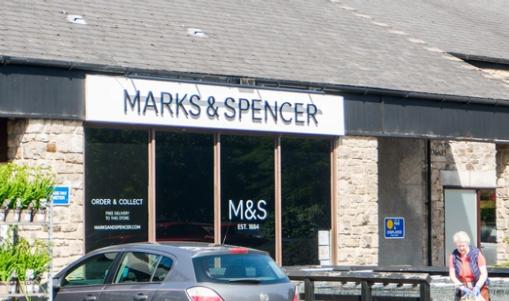

Travel stocks in demand as updates from Wizz Air and Ryanair reveal start of big summer getaway

Despite recession fears and a banking crisis, US markets have proved strong year-to-date with the Nasdaq Composite having rallied 33% and the S&P 500 up 16.5% at the time of writing.
Wall Street was buoyed by the latest US Core Personal Consumption Expenditures data on 30 June, which is the Federal Reserve’s preferred gauge of inflation because it strips out volatile energy and food products.
The data showed inflation creeping lower to 4.6% year-on-year from April’s 4.7% reading and was below the 4.7% rate the market was forecasting.
Investors reacted positively on hopes the Fed may be able to back off its inflation battle more quickly than chairman Jerome Powell has previously suggested.
Markets then consolidated gains on 3 July following the release of June’s ISM Manufacturing Purchasing Managers’ Index, with the reading dropping from 46.9 in May to 46 in June. This was worse than the 47.2 reading the market was looking for and signalled that economic activity in the US manufacturing sector continued to contract last month, but it also implies that the Fed’s aggressive tightening to tame inflation is working.
On 7 July, all eyes will be on the US non-farm payrolls, which will give investors a snapshot of how the economy is coping following 500 basis points of interest rate hikes from the US central bank since last year.

Evidence of continued solid jobs growth could
reinforce a view that has helped boost markets in 2023 to date, that the Fed can successfully pilot the world’s biggest economy away from recession and towards a ‘soft landing’. Though the Fed held rates steady in June, it has indicated more increases are coming this year, including a widely expected hike in July.
Cruise companies remain one of the most popular trades among US stocks, with Norwegian Cruise Line (NCLH:NYSE) having rallied by 18% over the five trading days to 4 July and up 85% year-to-date amid a sharp recovery in demand for a holiday at sea.
Tesla (TSLA:NASDAQ) advanced by 16% over the five trading days to 4 July thanks to delivering a record number of cars in the three months to the end of June. It is reaping the benefits of cutting prices which has spurred more people to buy its electric vehicles.
Sector peer Rivian Automotive (RIVN:NASDAQ) fared even better, with its share price rising 45% over the same five days after reporting that 13,992 trucks and vans were built in the second quarter, far exceeding market estimates of approximately 11,000 vehicles. [JC]

Don’t miss our weekly commentary on US stocks which is published every Friday on Shares’ website. Sign up to our free investment email and we will send you the link to the Wall Street Week column and other news stories.

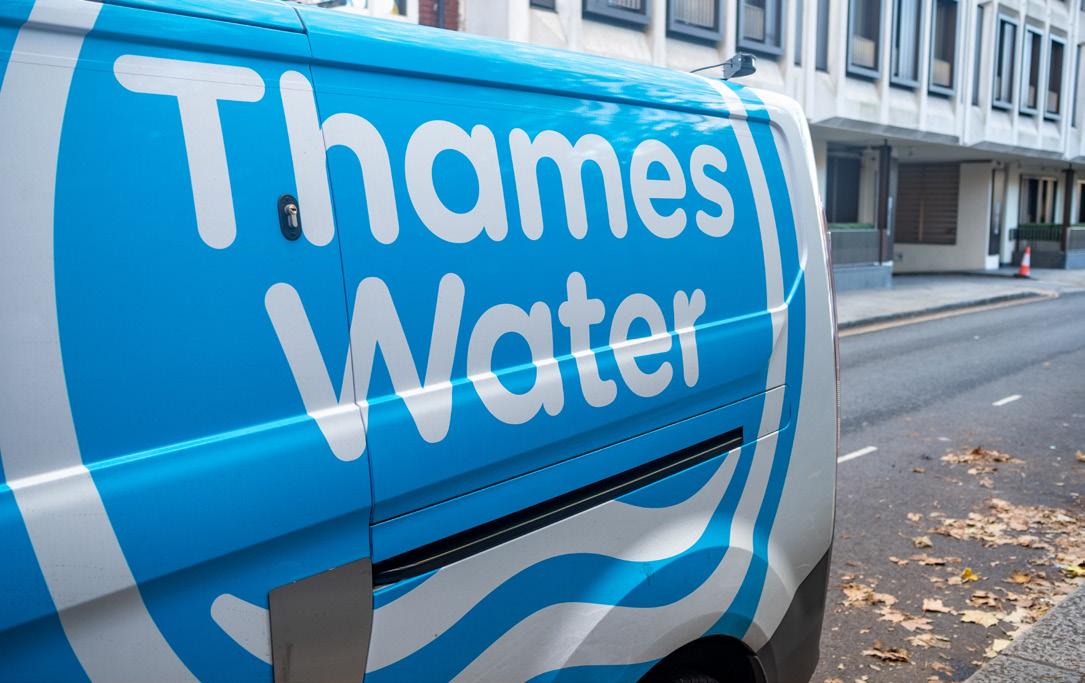
The potential collapse of Thames Water and a mooted move into public ownership amid spiralling debts has put the spotlight on the contingent of water utility firms on the UK stock market.
Saddled with their own significant borrowings and with investment required to fix the UK’s ageing water infrastructure, questions are being asked about their ability to continue to pay generous dividends to shareholders.
As Morningstar observes: ‘The problems facing Thames Water are not unique as the entire water utility sector in the UK is suffering from rising inflationary pressures and higher interest rates, especially as currently more than half of the sector’s debt costs on average are linked to the prevailing rate of inflation.’
The London-listed trio, United Utilities (UU.), Pennon (PNN) and Severn Trent (SVT) have all seen their share prices come under pressure since the news Thames Water was in talks over a temporary nationalisation in the event it is unable to service its net debt of £13.8 billion.
Utilities tend to have high levels of debt because their earnings are determined by the regulator and are therefore predictable. This means lenders
can have a decent degree of confidence in their earnings and are happy to lend to them.
The rapid increase in interest rates over the last 18 months means the costs of servicing these borrowings is going up. Many utilities also have a significant proportion of inflation-linked debt too. According to its latest full-year results Pennon’s index-linked debt represented 30.1% of total borrowings – the aim is to reduce this to between 20% and 25% by 2025.
Pennon, Severn Trent and United Utilities have all pledged to increase their dividends in line with inflation. For now, at least in the case of Severn Trent and Pennon, their balance sheets are taking the strain with dividends funded from debt.
The table shows the net debt to earnings before interest, tax, depreciation and amortisation for the listed water utilities. On another measure, their regulatory gearing levels are materially below the 80%-plus seen at Thames Water. At the last count Pennon’s, at 60.8%, is just above Ofwat’s notional target of 60%, United Utilities’ is just below at 58% and Severn Trent’s comes in exactly at 60%.
Regardless, funding their pay-outs from debt will not be sustainable in the long term and Ofwat introduced more stringent rules in March 2023 preventing water companies from paying dividends if their credit rating slips to BBB (the last rung of investment grade debt) with a negative outlook.
On the flipside, if the companies stop paying such generous dividends it will be hard to find investors who are willing to continue backing them. [TS]
Investors are looking hard at the stocks held in funds managed by Odey Asset Management for fear they will be dumped on the market as the hedge fund tries to raise cash. While some positions have already been cut, there remain plenty of stocks where its position has not changed (yet?).
The firm is restructuring following a Financial Times investigation into alleged misconduct by founder Crispin Odey, who has since left the business.
Odey Asset Management has been forced to suspend dealing in its flagship hedge funds Odey European and OEI Mac after being overwhelmed by investors’ redemption requests.
Reports suggest Odey Asset Management is in talks to transfer its five global equity funds to Lancaster Investment Management and a further four funds to SW Mitchell Capital.
Odey Asset Management is known for its high conviction, concentrated approach which includes less-liquid positions where the manager owns a relatively large chunk of a company’s capital.
While it won’t be liquidating its entire portfolios, there is a risk that any stock held by the hedge fund could be seen as having a share overhang until the restructuring is completed – i.e., a fear that the stock could be sold.
Shares in Shanta Gold (SHG:AIM) had been falling for several weeks on market fears Odey Asset Management was trying to sell an 8%+ position. On 30 June, the miner revealed the investor had cut its stake to 1.1%.
Another recent sale includes car retailer Pendragon (PDG) where Odey Asset Management’s holding went from 9.8% to 3.8%. It also sold an 18.9% stake in online electronics retailer AO World (AO.) to Frasers (FRAS).
Odey Asset Management is the largest
shareholder in biotechnology firm Oxford BioDynamics (OBD:AIM) with an 18.3% stake. At the end of May the biotech said it needed to boost revenue or find additional funding, sending the shares down 19%.
A 5.5% stake in flexible office provider IWG (IWG), formerly known as Regus, may be hard for Odey Asset Management to sell quickly on the market unless it finds a buyer for the whole lot. Its 56 million shares are valued at £76 million, representing over 30 days of average daily volume according to Refinitiv data.
Other stocks where the hedge fund owns more than 3% of the business includes Mirriad Advertising (MIRI:AIM) where Odey Asset Management has a 16.3% stake; package holidaysto-airline Jet2 (JET2:AIM) with a 3.9% stake; and 4.1% of brick maker Forterra (FORT). [MG]

Shares in the FTSE 250 transport company FirstGroup (FGP) have been on a strong run this year, up 42% as travel activity perks up. In March, it upgraded pre-tax profit expectations for the year thanks to a better performance with its bus operations (more passengers, fewer staff problems) and a better turn from its rail operations over the winter.
It then impressed investors with a strong set of full-year results on 8 June, with adjusted
profit more than doubling to £82.1 million, ahead of expectations.
It spent £130 million on replacing some of its bus fleet with electric vehicles and revealed plans for a new source of income. While buses are ferrying passengers from A to B, FirstGroup plans to let third party businesses use its ultra-fast chargers located at bus depots, with trials already underway in Scotland. Although the company was stripped of its TransPennine rail franchise in May following months of disruption, the group remained optimistic about its prospects. The shares trade on 14 times expected
earnings for the year to March 2024 versus circa eight-times pre-Covid and the nine to 13-times multiples for recent takeover approaches in the sector. [SG]
Despite a rise in third-quarter organic sales investors want a better outlook
Shares in US foods and snacks group Campbell Soup (CPB:NYSE) have fallen nearly 10% since it announced a disappointing set of third quarter earnings on 7 June.

This share price slide extends earlier pains; year-to-date its shares have fallen 18% and are currently trading around $46.
Although the company reported a 5% rise in organic sales, earnings before interest and tax fell 14% to $254 million and it reaffirmed full-year fiscal 2023 guidance
which disappointed investors who were looking for some sort of uplift in its outlook for this year and next. Marketing and selling expenses increased by 3% to $194 million, along with an 11% increase in administrative expenses.
Campbell Soup expects annual net sales to grow between 8.5% and 10% compared to analysts’ estimates for a rise of 9.5%, according to Refinitiv data.
Analysts at Morningstar don’t think it is all bad news for the American processed foods-tosnacks company. They said: ‘We think Campbell’s prudent strategic focus –
leveraging technology, data insights and artificial intelligence to bring consumer-valued new products to the shelf in a timely fashion while also reducing complexity, investing in automation, and optimising its supply chain and manufacturing network – has set it on a sound course.’ [SG]
FULL-YEAR RESULTS
July 11: Begbies
Traynor, D4T4 Solutions, Trifast
July 12: Loungers, Carclo, Ashmore, Renold
July 13: DSW Capital, IIika
HALF-YEAR RESULTS
July 11: Synectics
July 13: MusicMagpie
TRADING ANNOUNCEMENTS
July 10: MJ Gleeson
July 11: Vistry
July 12: Tullow Oil, Ten Entertainment
July 13: Experian, Barratt Developments, Hays
Investors will be looking for an update on the process to replace departing CEO Alistair Cox
A big profit warning on 14 June from Hays’ (HAS) rival Robert Walters (RWA) has created nervousness ahead of the former’s fourth quarter and full-year trading update on 13 July.
The recruitment space is often a bellwether for the wider economy and, with economic clouds gathering, the portents are not too promising.
This is despite April’s solid third quarter update from Hays, with the company seeing strong demand for temporary staff and pointing to second-half operating profit ‘modestly above’ the first half with the proviso that activity levels remained stable in the three-month period to 30 June.
Hays also faces the uncertainty of a transition to a new chief executive as Alistair Cox prepares to step down after 15 years in the role. Investors will be looking for an update on the process of finding his replacement.
Cox has successfully diversified Hays into new geographies and markets over the course of his tenure and this could stand the company in good stead to withstand volatility in the labour market.

As Liberum observes: ‘Hays is building an increasingly resilient model, diversifying into higher growth (for example, tech) and higher margin (diversity, equity and inclusion) segments.
‘There is a clear longer-term strategy in place to double earnings before interest and tax to more than £400 million by 2027, assuming a supportive market backdrop. The strong balance sheet supports attractive cash returns even in more difficult markets.’ [TS]

prized brand strength, pricing power, cash generation and long-run dividend growth record.
Soft drinks-to-snacks powerhouse PepsiCo (PEP:NASDAQ) has a track record of beating earnings forecasts then raising guidance. This means investors will be counting on another round of upwards earnings revisions when the company serves up second quarter results on 13 July.


However, there are no guarantees it will report good news, given PepsiCo is lapping demanding comparatives and contending with persistent cost and currency headwinds.
Analysts forecast $21.71 billion revenue (Q2 2022: $20.23 billion) and $1.95 earnings per share (Q2 2022: $1.86).
PepsiCo’s food and drink brands span everything from the eponymous fizzy pop to Mountain Dew, Doritos and Walkers crisps as well as Quaker Oats and Frito-Lay. Affordable repeat purchases enjoyed by consumers more than one billion times a day in over 200 countries and territories around the globe, these products underpin the company’s
On 25 April, PepsiCo raised full year 2023 organic sales growth guidance from 6% to 8% and its earnings per share forecast from 8% to 9% following a strong start to the year, with organic sales up 14.3% in the first quarter.
Chief executive Ramon Laguarta said the results demonstrated the investments PepsiCo has made to become ‘an even faster, even stronger, and even better organisation’. He added: ‘We remain committed to our strategic agenda and will continue to invest in our people, brands, supply chain, go-to-market systems, and digitisation initiatives to build competitive advantages and win in the marketplace.’
July 10: WD-40, PriceSmart, Chase

July 11: Eaton Vance, Nordic Semiconductor, AAR
July 12: Fastenal, DNB Bank, Washington Federal, MillerKnoll
July 13: Taiwan
Semiconductor, PepsiCo, Progressive, Delta Airlines, ConAgra Foods, Alcoa, Western Alliance, BancFirst
[JC]
Capital at risk.
That’s the sweet sound of taking control of your investments with AJ Bell.



Price: 90p Market cap: £418 million
Casino and bingo operator Rank (RNK) is trading 72% below pre-pandemic levels, and Shares believes the downside now looks limited while the upside from continued normalisation and the benefits from regulatory change could be significant.
Big changes are on the cards for the UK gambling sector following publication of the Government’s white paper in April which seeks to deter problem gambling and apply more onerous online affordability checks.
Yes, it means margins will take a hit across the board. However, casino and bingo operator Rank should see a revenue benefit as the new regulations level the playing field between online and land-based operators.
The upshot is that Rank has an opportunity to install 80 gaming machines per venue, four times the current limit as well as table games and electronic terminals with a random number generator akin to online gaming.
For the bingo sector the changes will remove the 20% restriction of B3 category machines (minimum £2 stake, maximum £500 prize) which is by far the most popular machine for Rank’s customers according to a recent management presentation.

Numis estimates Rank could generate an additional £35 million in annual operating profit. For comparison, the company is guiding for 2023 (June year-end) operating profit of around £20 million.
While the new legislation has still to be passed, the sector is preparing as if the recommendations will be implemented.
Rank saw its share price jump from circa 73p to 100p when the Government’s white paper came out, helped by analysts flagging the potential for ‘material’ upgrades to earnings forecasts, yet the shares have slipped back in recent months,
presenting a good opportunity to buy.
The casino sector has taken longer to bounce back from the pandemic than other leisure areas as overseas visitors have been slower to return to the UK.
Spiralling energy costs have also put a big dent in margins. But there are positive signs appearing and the drag from high energy prices appears to be abating.
Strong Christmas trading across the Grosvenor casino estate continued into the start of 2023 and a third quarter trading update in April confirmed the positive trend has accelerated.
Third quarter like-for-like sales increased 13% to £174.4 million with venues up 12% and digital up 16%. Grosvenor’s like-for-like revenues increased by 15% driven by growth in visitor numbers.
The Mecca bingo estate recorded like-for-like sales growth of 9% in the quarter driven by a 4% increase in visitors and 5% increase in spend per visit.
Meanwhile, the consensus earnings estimate for both 2023 and 2024 has started to move up for the first time in over two years for Rank. [MG]
The Government has proposed changes which should benefit the business, coinciding with a recovery in demand
Shares in the NHS technology platform firm could rally 30% to 40% depending on CMA investigation outcome
This is a little different to the sort of investment ideas Shares typically presents to readers. It is something of an arbitrage play.
We see NHS technology platform supplier EMIS (EMIS:AIM) as an attractive risk/reward option, where completion of the company’s takeover by $444 billion US peer UnitedHealth (UNH:NYSE) implies roughly 40% upside for the share price to the £19.25 offer level.
Yet beyond that, analysts calculate that even if the deal falls through, EMIS shares are still trading at a wide discount to peers, one that should narrow should it remain a London-listed independent business given its defensive UK healthcare exposure, high levels of recurring revenues and opportunity for accelerating growth.
Based on Canaccord Genuity’s peer group price to earnings calculations, a standalone EMIS should command a PE of circa 25-times, implying 30% upside to current share price levels.
EMIS provides vital technology to the UK’s thousands of GP practices and millions of NHS users. For example, it provides online appointments and prescriptions via its Patient Access application, and data management systems, including the electronic patient record system used by the majority of GPs in the UK.

The £1.2 billion UnitedHealth acquisition of EMIS was agreed more than a year ago, but it has fallen under the scrutiny of the Competition and Markets Authority. Its investigation identified potential threats to competition, primarily around the potential to restrict integrations around prescriptions and data analytics beyond Optum, UnitedHealth’s UK subsidiary.
EMIS is estimated to hold a UK market share of more than 50% in electronic patient records through its EMIS Web platform. The company
Price: £13.77
Market cap: £872 million
currently integrates with several third-party systems but doing so in the future could be seeding business to rivals of Optum, leaving UnitedHealth in a tricky position.
‘We suspect UnitedHealth will offer assurances and guarantees that it will continue to support integrations with other solutions, as is the case currently,’ says Canaccord.
The CMA has recommended a second phase review of the acquisition. This inquiry doesn’t necessarily rule out UnitedHealth’s EMIS takeover, but it may enforce stipulations that UnitedHealth simply won’t stomach – that’s the key risk.
On the other hand, it may give UnitedHealth the time it needs to come up with measures that will satisfy the CMA. It has until late August to present its final arguments and data, with a CMA decision due by late September. The whole process has a 5 October deadline.
This may be too high-risk for many readers, but if you are willing to accept the above explanations, EMIS could prove to be a profitable stock to trade, whether for the short-term, or over a longer timeframe, takeover permitting. [SF]

We stay positive on the stock
ASML (ASML:AMS)
€671.20
Gain to date: 25.6%
We selected semiconductor equipment maker ASML (ASML:AMS) as one of our tips for 2023 based on its long-term track record of growing earnings, which we felt was not fully reflected in its valuation after a tough preceding 12-month period for the shares.
This confidence was underpinned by ASML’s innovative technology which reinforces a strong competitive position.
Things have gone well. Expectations for semiconductor demand have ballooned thanks to the rapid developments in artificial intelligence and ASML has continued to churn out robust growth, helping the shares to reach 52-week highs of nearly €700.
In January 2023, the company reported a 28.6% increase in fourth quarter sales to €6.43 billion with a better-than-expected gross margin of 51.5%. Guidance suggested further improvement in margins and sales growth of 25% in 2023.
It followed up this bullish update with a better than expected first quarter though it did note some signs of caution amid its customers.
Recently, the Dutch government confirmed it will impose export controls on microchip manufacturing equipment to China in the face of pressure from the US government. That affects ASML but it does not expect the measures to have a material impact on its short or longerterm outlook.
At its investor day in November 2022, the company announced a target to reach between
€30 billion and €40 billion of revenues in 2025, or a 65% increase on 2022 taking the mid-point of the range, and between €44 billion and €60 billion of revenues in 2030 or almost three times 2022’s total, taking the top of the range.
While the Chinese export restrictions are a fresh complication for the business, we are reassured by the company’s statement and remain strong believers in its long-term potential, driven by several big technological themes. In our view the shares remain a buy. [TS]
Adding a new banner name to its client roster by signing a five-year deal with the UK’s number four supermarket chain Morrisons is a timely reminder of the potential of Eagle Eye Solutions (EYE:AIM).
Eagle Eye’s loyalty and promotions omnichannel software-as-a-service platform called Eagle Eye AIR is clearly gaining traction with retail businesses. The platform allows client customers to validate and redeem digital promotions in real-time, a key loyalty lever to pull in a budget-conscious climate.
The new agreement will see Eagle Eye’s AIR platform rolled out to all the supermarket’s 499 UK stores, a strong vote of confidence from Morrisons. This will allow the supermarket to beef-up its own customer loyalty programme and allow its shopper to enjoy exclusive product prices and earn points that can be cashed-in at the checkout on product lines, fuel, instore or online.
‘It will offer Morrisons more ways to engage with customers and facilitate scaling-up the volume of targeted offers available, giving customers more choice,’ said analysts at Shore Capital.
New business momentum has been positive in 2023 with a string of contract wins.
The Morrisons contract news gave investors and the share price a big lift – the stock jumped
nearly 9% on the announcement. Yet 2023 to date has been marked by share price volatility, understandable for a relatively young company early in its growth journey and where profit is coming from a low base.
That said, we continue to see Eagle Eye as a company perfectly placed to emerge as a vital technology partner to retailers, and its growing list of banner names – Tesco (TSCO), Diageo (DGE), Greggs (GRG), Coca-Cola (KO:NYSE), AnheuserBusch InBev (BUD:NYSE) and now Morrisons, underlines this potential. [SF]






 By Ian Conway Companies Editor
By Ian Conway Companies Editor
confidence appears to be holding up, bolstered by the tight labour market, and it may be this which decides the direction of the housing market over the months and years to come.

June’s larger-than-expected half percentage point interest rate rise has pushed the FTSE 100 index back into negative territory for the year and triggered fears of recession among investors and market observers.
Moreover, there seems little doubt the UK central bank will raise rates again at its August meeting, the only question being by how much.
‘It now appears that interest rates may go higher than were forecast and stay there for longer, in the context of stickier inflation and labour data strength. All of which suggest that a recession in the UK is now inevitable. All that remains to be seen is how deep this recession will be,’ says Colleen McHugh, chief investment officer of Wealthify.
Yet, for all the gloomy commentary, consumer
The number one concern for most people at the moment is the cost of living, with Kantar reporting 70% of shoppers it surveyed recently describing themselves as either ‘very’ or ‘extremely’ concerned about rising prices.
While the official inflation rate was steady at 8.7% in May, key items such as housing, electricity and gas prices are up by over 10% while food and drink prices are still rising at close to 20% on last year.
Even though price rises may slow in the next few months as we lap double-digit increases in the second half of last year, we’re still looking at prices
YTD = year-to-date. NAV = net asset value
going up rather than going down.
Now, mortgage costs are rising with the banks repricing their offers almost on a weekly basis as they rush to keep up with higher funding costs.
Last week, Barclays (BARC), NatWest (NWG) and Virgin Money (VMUK) told brokers that rates on many of their mortgages would rise on Friday, meaning June could have seen the steepest onemonth rise in borrowing costs since May 1989, excluding last autumn’s disastrous mini-Budget. Although mortgage rates were much higher in the late 1980s, the loan-to-income ratio today is almost double what it was then so a cost of 6% represents a similar financial burden to 13% in 1989.
Provisional government figures show residential housing transactions fell 15% during the first quarter of this year, although that figure was flattered by a strong performance in March which was the final month for buyers to complete before
the end of the Help To Buy equity loan scheme. Without Help to Buy, April’s level of transactions was down 32% on last year and down 29% from March on a seasonally unadjusted basis to just 67,000, a decline which as the government’s own statisticians say seems ‘particularly large’.

On a more positive note, the RICS UK residential market survey, widely seen as a lead indicator of future house prices and activity, has turned less negative in the last couple of months, with enquiries, prices and sales all showing an improvement since March.
The level of new buyer enquiries in May was the best – or as the survey says the least negative – in 12 months, while the net balance of house prices, while still negative, showed a marked improvement from the first quarter, and agreed sales and expected sales indicators were also pointing up.
We should caveat this with the fact the May survey was conducted before the latest inflation figures and subsequent rate hike, and the June survey – which is likely to be less positive – is due out within days.
Figures for mortgage lending, which are compiled by the Bank of England and always lag by a couple of months, seem to be following the downward trend in transactions, however.

YTD: year-to-date
Table: Shares magazine • Source: Sharepad, Shares magazine. Data correct as of 30 June 2023
Sharepad, Shares magazine. Data correct as of 30 June 2023
Table: Shares magazine • Source: Sharepad, Shares magazine. Data correct as of 30 June 2023
YTD: year-to-date


YTD: year-to-date Table: Shares magazine • Source: Sharepad, Shares magazine. Data correct as of 30 June 2023
April saw net repayments of £1.5 billion, which at the time was the lowest level of net borrowing since 1993 if the pandemic is excluded, while net mortgage approvals, which are an indicator of future borrowing, continued the decline seen since the start of 2021. In May there £0.1 billion of net repayments on mortgage debt.
Table: Shares magazine • Source: Sharepad, Shares magazine. Data correct as of 30 June 2023
activity at very low levels. Given the poor outlook for approvals, very low, or even negative net lending is likely to be the norm for the summer,’ says Martin Beck, chief economic advisor to the EY ITEM Club.
It seems consumers have been drawing down their cash savings. In May, there was £4.6 billion more withdrawn than paid into bank or building society accounts – the highest level since records began 26 years ago.
Moreover, mortgage rates have risen sharply following June’s half percentage point interest rate hike meaning house buyers face even greater costs.

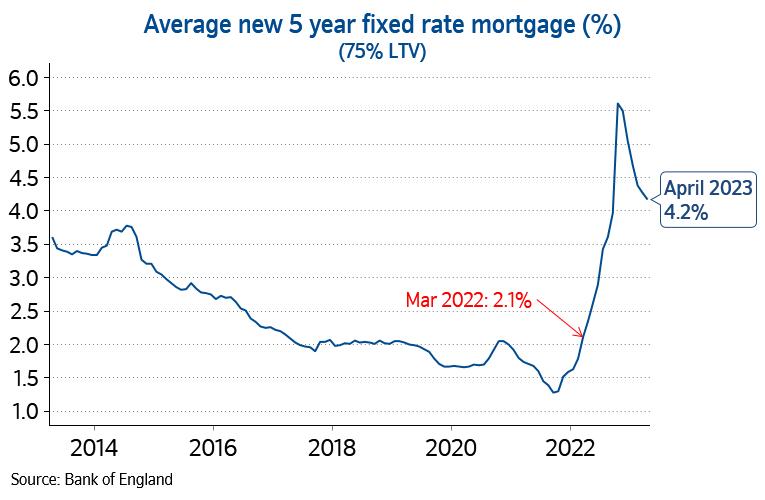
‘This has caused a significant deterioration in mortgage affordability and is likely to keep housing





















It is hard to get a clear picture of the sales market from the listed estate agents such as Savills (SVS) and Winkworth (WINK:AIM), due to the fact that rentals and property management fees make a large proportion of their income, but comments by Winkworth’s chief executive Dominic Agace are worth flagging.



Speaking in April, Agace described the residential market as ‘remarkably resilient’ until the miniBudget in October 2022, when confidence was upset. He noted the ongoing reversal of the Covidinduced race for space, with a reversion to office


YTD: year-to-date
YTD: year-to-date
Table: Shares magazine • Source: Sharepad, Shares magazine. Data correct as of 30 June 2023
YTD: year-to-date
Table: Shares magazine • Source: Sharepad, Shares magazine. Data correct as of 30 June 2023
Table: Shares magazine • Source: Sharepad, Shares magazine. Data correct as of 30 June 2023 working and city life returning to business as usual, which translated into fewer home sales.
Even if the housing market as a whole seems to be less bad than at the start of the year, the new-build market is under huge pressure.
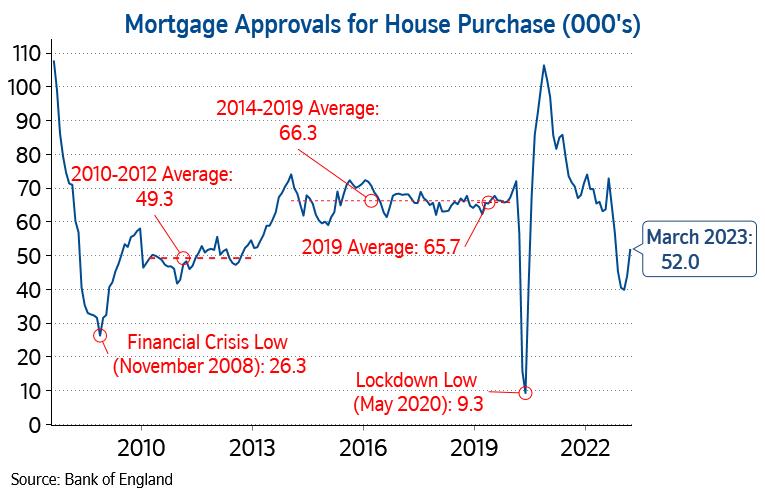
Newcastle-based developer Bellway (BWY) reported a 25% drop in reservations in the first five months of the year, reducing its forward order book to 6,172 homes with a value of £1.7 billion, 29% lower than at the same point last year.

‘Given the profile of completions in the coming months and prevailing reservation rates, a further decrease in the order book is likely by 31 July 2023 and, as previously guided, volume output is expected to moderate in the next financial year,’ the firm cautioned.
Rival Berkeley (BKG) revealed current-year reservations were down around 15% and said it was ‘adopting a more considered approach to new sales launches and being more cautious on the pace of investment in our ongoing sites.’
It added: ‘In this type of market there is a lack of urgency and transactions typically stem from owner-occupiers with a current motivation to move or investors with immediately available funds, with
demand therefore weighted to “product” which is closer to delivery, as opposed to off-plan sales that do not complete for two to four years.’
In response, Berkeley is cutting its output and guided that unit sales this year will be around 20% lower than last year.
That in turn is feeding through to suppliers, with Travis Perkins (TPK), the UK’s largest provider of building materials, lowering its operating profit guidance last month as demand from newbuild housing and the repair, maintenance and improvement market dwindled due to ‘higher interest rates and weaker consumer confidence driven by persistent, higher than anticipated consumer price inflation.’
Morgan Stanley’s UK economist Bruno Skarica sees two further quarter percentage point rate rises, in August and September, by which time the economy will be ‘flatlining at best’, with the jobless rate creeping higher.
Which raises an interesting question – could the direction of the housing sector depend less on how high interest rates go and more on how confident people are in the economy and how comfortable they feel in their jobs?
Somewhat surprisingly, last month’s GfK consumer confidence survey suggests people

are growing more optimistic regarding both the general economic situation and their own personal finances over the next 12 months.
‘Despite the fierce economic headwinds of the cost-of-living crisis, double-digit grocery price increases, and the mortgage squeeze severely impacting both homeowners and renters alike, the UK Consumer Confidence Index has improved by another three points in June, the fifth monthly improvement in a row,’ observes GfK’s client strategy director Joe Staton.
‘This is the best showing for the overall index score for the past 17 months and, if consumers continue to weather the current economic storm, then this will provide a firm foundation for getting back to growth.’
This confidence probably stems from the fact the number of people in work increased to a record high last quarter and now exceeds prepandemic levels, with a rise in both the number of employees and the self-employed according to estimates from the Office for National Statistics.
The number of full-time employees increased during the latest quarter and is above prepandemic levels, while part-time employees also increased during the latest quarter but remain below pre-pandemic levels.
While the number of vacancies continues to drift lower, reflecting uncertainty in some parts of the economy, there were still over one million unfilled posts in May, while average pay excluding bonuses rose by 7.3%, the highest growth seen outside of the pandemic.
Finally, the redundancy rate fell to 3.3 per thousand employees which takes it back below pre-pandemic levels and continues the downward trend which has been in place for the last decade.
So, our overall impression is that even if higher interest rates push the economy into recession later this year or early next year, which is defined as two consecutive quarters of negative growth, as long as it doesn’t nose-dive, causing mass layoffs in the process, consumer confidence should hold up which in turn should support the housing market.
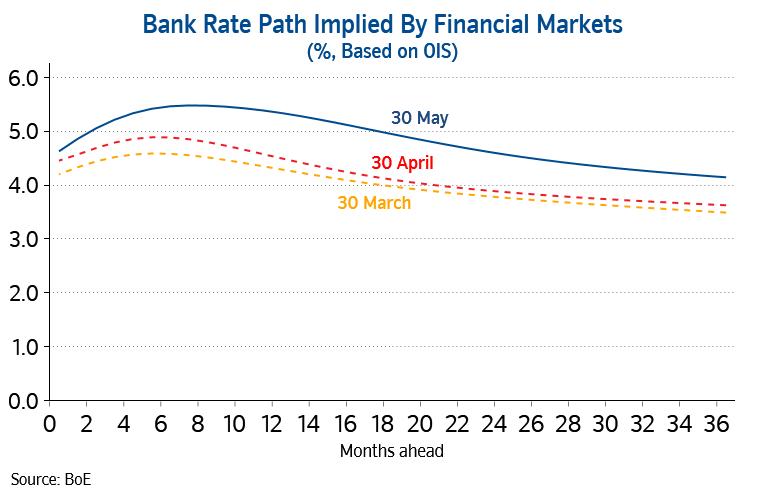
Higher interest rates and a shortage of housing are tailwinds for professional landlord Grainger, which has a portfolio of 9,700 homes and an occupancy rate of almost 99%, a company record.
‘Momentum in the business is continuing as we move into the peak summer lettings season,’ says chief executive Helen Gordon.
Sheffield-based MJ Gleeson specialises in affordable homes, with an average selling price of £186,000 in the six months to December 2022 against a UK average house price of close to £300,000. That doesn’t make it immune to the weak market, but it may attract buyers who are lowering their sights in terms of affordability.

After a better-than-expected 2022, which chief executive Gareth Samples called his ‘busiest year ever’, the first quarter of 2023 has already surpassed management expectations in terms of lettings demand. The sales business will undoubtedly be a drag, but the firm’s franchise model and its recurring rental revenue put it in a strong position.


It has been a tough few weeks for investors in Ecofin US Renewables (RNEW), with its share price taking a hit from unwelcome news. A tornado damaged one of its wind farms which accounts for more than a third of its net asset value. Mice eating through cables at one of its solar farms caused further interruptions, and the dividend has been cut in half temporarily.

The problems in this space are not limited to Ecofin. According to figures from the AIC, the renewable energy infrastructure sector for investment trusts has seen an average -10% share price total return over the past 12 months. The broader infrastructure sector is even worse with a 16.6% negative total return.
This situation has attracted the attention of people across the pond, according to chatter among investment experts. It could be the trigger for a new wave of takeovers or mergers in the space.
While Ecofin has company-specific issues, demand for its assets and what they produce remains strong. That is the same situation across the renewables and infrastructure space and it could lead to one of two events.
First, we could see private equity or large infrastructure groups swoop on UK investment trusts given there are examples trading at more than 20% below net asset value. Ecofin US Renewables, for example, trades on a 36% discount and buying the trust would be a straightforward way for another company to snap up a package of assets –potentially paying a decent premium to where the share price currently sits but still getting the assets for less than buying them individually on the market.
Nick Greenwood, manager of the Migo Opportunities Trust, says he owns a stake in Aquila European Renewables (AERI) for this reason. ‘Demand is quite high for solar plants in Iberia and
wind farms in Scandinavia – so there is an arbitrage developing there. The shares are on a 22% discount but they own assets other people want.’
If takeovers do not happen then mergers could follow. Eighteen of the 22 trusts in the renewable energy infrastructure sector are worth less than £1 billion, 10 of which below £400 million.
Consolidating the sector to a much smaller number of trusts with greater scale would make them more appealing to wealth managers.
There is little to differentiate what the renewable trusts do and demand has dwindled over the past year. That is because rising interest rates have negatively impacted their valuations and investors can get risk-free returns from gilts and cash at the same 4% to 5% rate as the trusts’ historical dividend yields.
‘Most of the selling we’re seeing with these trusts is institutions getting redemptions (so they need to find assets to sell to raise cash),’ says Greenwood.
The decline in share prices has lifted the average dividend yield in the renewables investment trust sector to 6.6%, according to the AIC. A selection offers 7% to 8% yields and that might be the bare minimum needed to attract investors now that the risk-free rate is 4% to 5%.
It suggests that share prices in this space may not bounce back to levels seen in recent years unless we see M&A. Yet the reasons to see corporate deals are growing by the day, so do not take your eye off this space.
In theory profits should be up sharply but analysts are not fans of the sector
While motorists have benefitted from falling petrol and diesel prices this year – helping to offset some of the increased cost of the weekly shop – many are finding their motor insurance quotes have gone through the roof, typically with no explanation.
According to the ONS (Office for National Statistics), car insurance prices have jumped more than 40% in the last 12 months, while the ABI (Association of British Insurers) reckons the average premium for private comprehensive motor cover was £478 in the first quarter, 16% higher than a year ago and the highest price since the fourth quarter of 2019.

However, The Guardian reports irate customers of Direct Line (DLG) and Saga (SAGA) have been quoted renewal prices ranging from 50% to 75% above their existing policy.
In theory, this should mean motor insurers are raking it in, yet their share prices tell a very different story with only Sabre (SBRE) in positive territory so far this year.
The companies claim not to be profiteering, and under FCA (Financial Conduct Authority) rules introduced in January last year they are banned from ‘walking up’ renewal prices, so what is going on?

As the ABI points out, the ‘walking up’ rules don’t mean a cap on prices, so the insurers are hiking quotes for new as well as existing customers to cover higher claims costs and volumes.
Higher prices for paint and materials as well as courtesy cars, plus delays in getting parts – in particular computer chips – which are affecting 40% of repairs, are all blamed for the rise in insurance prices.
The ABI estimates motor claims cost the insurance industry £2.4 billion in the first quarter of 2023, 14% more than the same period a year
ago and the highest level since it started keeping track of the data a decade ago, with the cost of vehicle repairs up 33% to £1.5 billion, also a record.
If the firms were hoping analysts would back them up, they barely have a good word to say with Citigroup cutting its recommendation on Admiral Group (ADM) from ‘hold’ to ‘sell’ last month and JPMorgan putting Admiral and Direct Line on ‘negative catalyst watch’.
Then again, the companies have hardly helped themselves of late with Direct Line being told last week by the FCA it needs to go back through its records and compensate some customers for underpayments on written-off cars between 2017 and 2022, and Admiral’s UK insurance head Cristina Nestares selling off over £700,000 worth of the company’s shares in May.
By Ian Conway Companies Editor
With high standards of corporate governance and a rich heritage of entrepreneurialism, the UK has an abundance of exciting investment opportunities for investors to consider within the small and mid cap space. The Schroder British Opportunities Trust (SBO) was launched in December 2020 to tap into this potential, facilitating and driving growth across both publicly-listed and privately-owned businesses.
The ability to invest across both public and private opportunities is a key differentiator for the trust. Normally, funds are restricted to investing in one or the other but, with its ability to access both public and private markets, for SBO, this means a broader universe of exceptional opportunities from which to select the best of Britain’s fastest-growing young businesses.
With its acknowledged expertise in both public market and private equity investing, Schroders is uniquely well-placed to capture this broad opportunity. It has a long and impressive track record of investing in public companies and is particularly well-known for its small and mid-cap expertise. Meanwhile, with more than £10bn in assets under management, Schroders Capital has been investing successfully in private companies for more than 25 years.
Irrespective of whether they are listed or not, the businesses SBO seeks to invest in have some common characteristics. The core focus is to invest in high quality companies that have strong balance sheets and a long runway for growth. Typically, these businesses will exhibit strong pricing power (which is particularly beneficial in these times of high inflation), robust management teams, and will already be delivering good revenue growth. There is a preference for investing in businesses that are already profitable, but if the team is investing in loss-making companies, it ensures they are well-funded and possess a clear, and near-term. route towards profitability.
All of these characteristics should ensure relatively resilient revenue streams, even in a challenging
economic environment and, on balance, that is precisely what the managers have seen from the portfolio over the last eighteen months.
At its most recent financial results (30 September 2022), 64% of SBO’s portfolio was invested in private businesses, spread across nine businesses. The public part of the portfolio has more positions but at smaller weights. Stock turnover is low, although a series of takeovers in 2022 led to modestly higher activity than the team would normally expect. Euromoney, EMIS and Ideagen were all sold after receiving bids, with the proceeds recycled into other opportunities that have strong and sustainable growth prospects. Whilst it isn’t part of the strategy to explicitly target takeover candidates, this series of deals (including the acquisition of Waterlogic from the private equity portfolio) does suggest the team has been successful in identifying undervalued businesses. M&A activity has been the catalyst for realising that undervaluation and the portfolio managers believe the portfolio consists of attractive opportunities that could also be targets.
Whilst software and IT services represent the largest two sector weights in the portfolio, the fund is well diversified across a range of other sectors, including consumer services, healthcare, leisure and financial services. This reflects the breadth of
the opportunities the managers have been able to identify, which also de-risks the portfolio from being too concentrated.
Performance from the portfolio so far has been modestly positive, despite the challenging backdrop in 2022. The trust’s net asset value (NAV) has increased by 2.4% since launch, at the time of writing. The private portfolio has delivered very positive progress, with an aggregate fair value increase of 48%, based on strong operational progress. Whilst this is encouraging, it has been offset by the public element of the portfolio, where the share prices of many small-to-mid sized UK growth businesses have struggled. This doesn’t necessarily reflect poor operational performance, but rather, negative market sentiment has held valuations back.
Examples that reflect the quality of the opportunities the managers have invested in include Easypark and Mintec. Easypark is a leading parking technology business that helps drivers find, manage and pay for parking, as well as electric vehicles charging points, through their phones. The business model is already well-established, and it offers considerable growth potential as it rolls out its technology in new territories. Its ambitious management team is currently driving a geographical expansion which means that it can now help drivers in more than 25 countries across over 3,200 cities. The company is already profitable, and its technology is proven, which de-risks the next phase of its scaled development.
Meanwhile, Mintec is the world’s leading independent provider of commodity price data and market intelligence to global food and manufacturing brands. Its cutting-edge software platform delivers highly valued data and analysis on thousands of different commodities and other food ingredients, which enable its customers to implement more efficient and sustainable procurement strategies. With expertise developed over more than three decades, Mintec has capitalised on its superior data collection and analysis capabilities to build a formidable market position. A subscription-based business model provides excellent revenue visibility, and its continued global organic growth should deliver higher margins as it scales.
The SBO team (Co-Portfolio Managers Rory Bateman and Tim Creed, together with team members Uzo Ekwue and Pav Sriharan), view the portfolio as a very exciting proposition right now. They have found abundant opportunities to invest in high quality growth businesses that are able to thrive even in a challenging economic environment. Indeed, the
current economic challenges add to SBO’s future potential because they mean the managers can access those opportunities at extremely attractive valuations.
Importantly, SBO’s private equity allocation is not focused on the pre-IPO or ‘crossover’ part of the market, where a considerable amount of capital has flowed in recent years leading to excess valuation risk. Nor is it targeting earlier-stage venture capital companies, where the recent market downturn has had a notably negative impact, putting some businesses under significant funding risk.
In contrast, SBO’s private allocation is focused on later-growth capital and small-to-mid market buyout stage companies. Here, valuations have in some cases contracted, but declines have been relatively modest. Meanwhile, robust operational performance has meant that the impact of earnings growth has more than offset the valuation contraction.
The SBO investment case is currently enhanced by two forms of discount. Firstly, the UK is among the cheapest of any regional stock markets at present, with a 40% valuation discount to global peers. This provides investors with the opportunity to invest in UK assets at a discount to what they would be worth if they were listed on practically any other market.
Secondly, over the course of 2022, SBO’s share price slipped to a discount to net asset value. Prior to this, the shares had traded close to NAV, but investors can now buy the shares at a discount of more than 30% to NAV. This discount perhaps reflects concern that the private element of the portfolio may be vulnerable to valuation downgrades in the coming months. Other private equity investment trusts have also slipped to a discount but, in the case of SBO, the portfolio managers strongly believe those concerns are misplaced. As explained above, the operational performance of the private portfolio has been very positive in aggregate and momentum remains generally strong, suggesting the direction of travel for valuations may actually be up not down. This reflects the resilient characteristics the team is seeking to invest in and the maturity of its portfolio companies, which are already at or close to profitability, and growing revenues at a rapid pace.
Nevertheless, the combination of these two discounts provides a window of opportunity for investors to currently buy a high quality, fast-growing portfolio of UK businesses at a very attractive price.
Click here to find out more about the Schroder British Opportunities Trust
Past performance is not a guide to future performance and may not be repeated. The value of investments and the income from them may go down as well as up and investors may not get back the amount originally invested. Exchange rate changes may cause the value of any overseas investments to rise or fall. Subscriptions for fund units can only be made on the basis of its latest Key Investor Information Document and Prospectus, together with the latest audited annual report (and subsequent unaudited semi-annual report, if published), copies are available in English and can be obtained, free of charge, from Schroder Unit Trusts Limited.
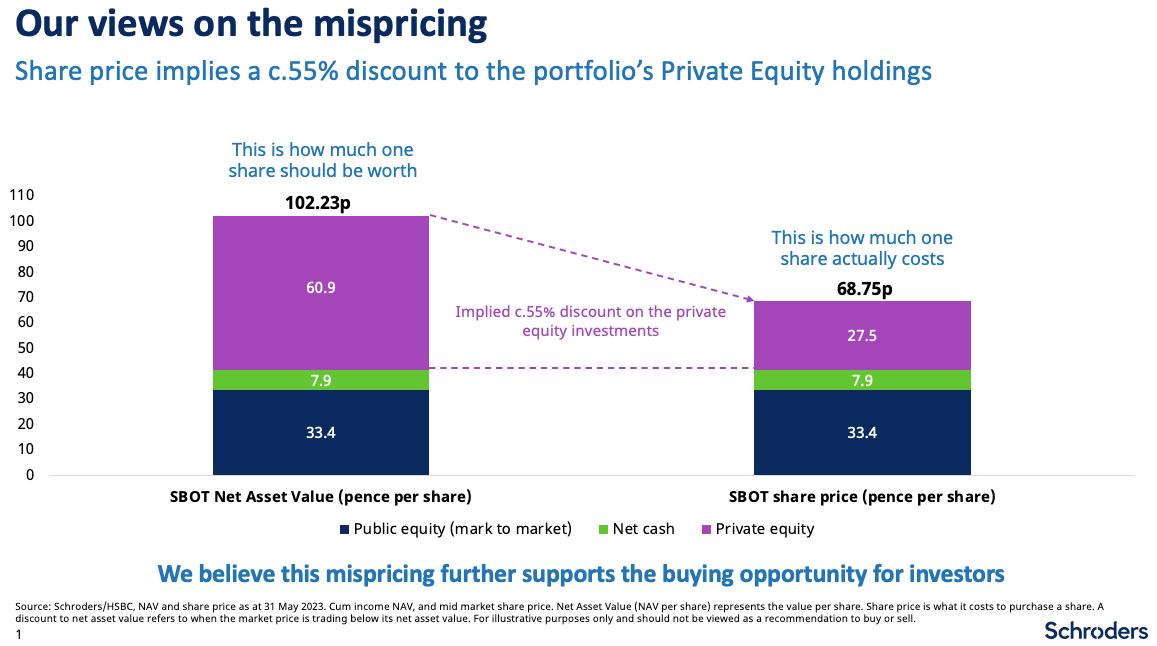
Schroders has expressed its own views and opinions in this document and these may change. This information is not an offer, solicitation or recommendation to buy or sell any financial instrument or to adopt any investment strategy. Nothing in this material should be construed as advice or a recommendation to buy or sell. Information herein is believed to be reliable but we do not warrant its completeness or accuracy. Any data has been sourced by us and is provided without any warranties of any kind. It should be independently verified before further publication or use. Third party data is owned or licenced by the data provider and may not be reproduced, extracted or used for any other purpose without the data provider’s consent. Neither we, nor the data provider, will have any liability in connection with the third party data. The material is not intended to provide, and should not be relied on for accounting, legal or tax advice. Reliance should not be placed on any views or information in the material when taking individual investment and/or strategic decisions. No responsibility can be accepted for error of fact or opinion. The forecasts included in this presentation should not be relied
upon, are not guaranteed and are provided only as at the date of issue. Our forecasts are based on our own assumptions which may change. We accept no responsibility for any errors of fact or opinion and assume no obligation to provide you with any changes to our assumptions or forecasts. Forecasts and assumptions may be affected by external economic or other factors.
Any references to securities, sectors, regions and/or countries are for illustrative purposes only.
Schroders will be a data controller in respect of your personal data. For information on how Schroders might process your personal data, please view our Privacy Policy available at www.schroders.com/en/privacy-policy or on request should you not have access to this webpage.
For your security, communications may be recorded or monitored.
Third party data is owned or licensed by the data provider and may not be reproduced or extracted and used for any other purpose without the data provider’s consent. Third party data is provided without any warranties of any kind. The data provider and issuer of the document shall have no liability in connection with the third party data. The Prospectus and/or www.schroders.com contains additional disclaimers which apply to the third party data.
Issued in July 2023 by Schroder Unit Trusts Limited, 1 London Wall Place, London EC2Y 5AU. Registered No: 4191730 England. Authorised and regulated by the Financial Conduct Authority.

Nigel Pocklington, CEO
Good Energy Group (GOOD) is a supplier of 100% renewable power and an innovator in energy services. It has long term power purchase agreements with a community of 1,700 independent UK generators. Since it was founded 20 years ago, the company has been at the forefront of the charge towards a cleaner, distributed energy system.
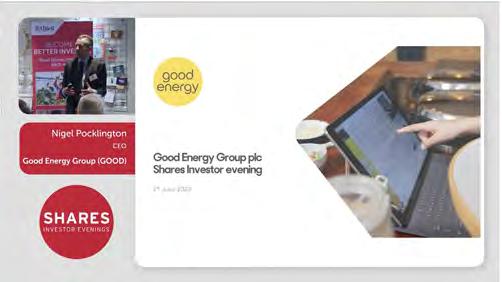
Brusk Korkmaz, CEO & Paul David
Wheatcroft, CFO
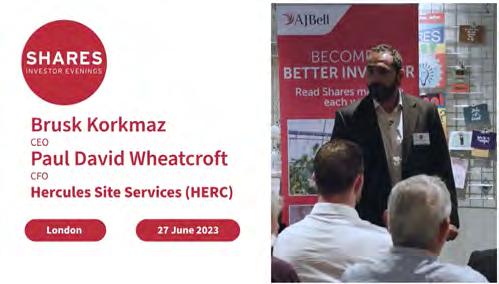
Hercules Site Services plc (HERC) is a leading technology enabled labour supply company for the UK infrastructure sector, which has joined the AIM market. Founded in Gloucestershire in 2008 by CEO Brusk Korkmaz, Hercules provides labour-related and a diverse range of other services to many blue-chip clients in the infrastructure sector.
Ken Wotton, Fund Manager
Strategic Equity Capital (SEC) is a specialist alternative equity trust. Actively managed, it maintains a highly-concentrated portfolio of 15-25 high-quality, dynamic, UK smaller companies, each operating in a niche market offering structural growth opportunities.
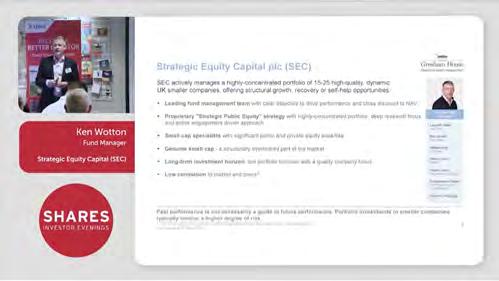

The FTSE 100 firm’s foods portfolio is unfairly overlooked given it accounts for half of group operating profits
Discount fast-fashion chain Primark dominates discussions around Associated British Foods (ABF).
But as well as being the company behind the budget retail brand, now the UK’s largest clothing, footwear and accessories seller by volume, the Weston family-controlled conglomerate also encompasses leading food and ingredients businesses.
These bits of the group are often neglected in the wider analysis of the FTSE 100 company despite offering diversification away from the often-fickle retail sector. Notably the £15.4 billion cap continues to invest in these areas for future growth.
Thriving in the UK, where its cut-price clothing is drawing in price-sensitive shoppers during this cost-of-living crisis, Primark is also expanding across Europe and pushing into America, making it an irresistible growth story for market watchers to comment on.
Though Primark hogs the headlines, Associated British Foods is in fact split into five divisions. Yes, the retail brand accounts for 50% of group earnings before interest and tax or operating profit, but that means the four other divisions also contribute a combined 50% and therefore merit more attention from investors as a result.
The grocery business accounts for 26% of earnings, sugar represents 11%, the ingredients
It is frequently suggested that Associated British Foods should spin off Primark, the jewel in the conglomerate’s crown churning out growth most retail rivals would kill for. The argument goes there are no obvious synergies between Primark and the food businesses, that a demerger would enable Primark to shine under a separate management team while unlocking value for investors.
discount of around 30% to global retail peers including Swedish fast-fashion seller H&M (HM-B:STO), Zara-owner Inditex (ITX:BME), Uniqlo-parent Fast Retailing (9983:TYO), as well as GAP (GPS:NYSE) and Pepco (PCO:WSE).
The broker regards this discount as ‘excessive given Primark’s margin profile and significant future growth prospects’, which would seem to add weight to the case for a break-up of the group.
Yet Associated British Foods’ management has always resisted any clamour for a demerger. They see the conglomerate’s diversity as a strength, with the cash flows generated across the group’s portfolio of businesses underpinning its long-run record of earnings growth and capital returns through dividends and buybacks.

On a sum of the parts basis, Liberum points out Primark is underappreciated by the market with an implied price-to-earnings valuation
operation accounts for a further 10%, and there is an interesting agriculture business which chips in 3% of earnings.
In the third quarter to 27 May 2023, Primark delivered a 13% sales rise to the best part of £2 billion, but sales from the four divisions which make up ‘total food’ increased by an even more impressive 18% to almost £2.73 billion.

Associated British Foods reported strong constant currency sales growth in grocery and ingredients at 13% and 10% respectively. This was driven by price hikes implemented earlier in the year to offset input cost increases, demonstrating decent pricing power.
The two biggest food units by revenue – grocery and sugar – provide extra legs to growth beyond Primark. Generating more than £3.7 billion in revenue in the year ended 17 September 2022, the grocery division makes and markets a range of international and local food brands ranging from Twinings tea and Ovaltine malted drinks to Kingsmill and Allinson’s breads, Jordans cereals,
One good example of this is the shuttering of non-essential retail during lockdown, as the grocery, ingredients, agriculture and sugar divisions were able to pick up the slack.
Patak’s Indian food and Mazola cooking oils.
It also spans the Silver Spoon and Billington’s retail sugar brands in the UK, and sports nutrition sector labels HIGH5 and Reflex Nutrition.
Odds are you consume some of these products, since nine out of 10 UK households use Associated British Foods’ grocery brands. And this part of the business has potential for overseas growth too.
Headwinds for the grocery business include cheaper private label competition, which is taking share from brands as shoppers grapple with costof-living pressures, as well as the margin erosion from cost inflation, though Associated British Foods has successfully passed through most of the latter to customers through price increases and Liberum sees grocery operating margins expanding to double digits in full year 2024.
While health-conscious consumers are trying to reduce their sugar intake, the reality is billions of us have a sweet tooth, which underpins the prospects for the world-leading-yet-lumpy global sugar production business. With operations in the EU, Africa and China and over £2 billion of sales last year, this division has the capacity to produce 4.5 million tonnes of sugar annually.
However, there are risks for investors to weigh, among them weather, which can impact the quantity and quality of beet sugar and sugarcane crops, as well as European and world sugar prices, which are currently high but prone to volatility which can lead to a bumpy earnings profile.
Readers may be unaware that Associated British Foods’ sugar-making plants are also highly efficient ‘bio-refineries’ that enable it to produce products maximising the value from every root of sugar beet and every stick of sugar cane; these include animal feed, biofuels and speciality products sold into industry sectors including food and drink, fuels, pharmaceuticals, industrials, agriculture, horticulture, power and energy.
Further diversifying the business are Associated British Foods’ ingredients operations, which are leaders in yeast and bakery ingredients as well as in ingredients for animal nutrition, pharmaceutical and various other industries. With annual sales approaching £1.83 billion at last count, the ingredients arm has also done well in this high inflation environment by successfully recovering elevated costs.
Finally, there is the agriculture arm, which
manufactures animal feed, nutrition and technology-based products and offers data services for the agri-food industry. This part of the business supplies everything from compound animal feed, feed enzymes and specialised feed ingredients to a range of value-added services to farmers, feed and food manufacturers, processors and retailers.
This is a fragmented market with opportunities for consolidation and Associated British Foods is playing its part, having recently announced (6 June) the acquisition of milk recording and data specialist National Milk Records. While this was a modestsized deal at £48 million, broker Shore Capital believes National Milk Records will ‘bolster ABF’s presence in the UK dairy scene’.

Thanks to its conglomerate structure Liberum believes the most appropriate way to value
Associated British Foods is through a discounted cash flow and sum of the parts analysis. This underpins the broker’s £24 valuation. This compares with a share price at the time of writing of £19.93.
By James Crux Funds and Investment Trusts Editor
Investors need to be aware of the impact of withholding levies
Most investors probably think they only need to fill in paperwork on dividends if they are investing in stocks listed in other parts of the world – but that is not necessarily the case.

Withholding tax is levied by the government of an overseas company on dividends received by people who are not residents of said country.
The UK market is home to several big companies, including in the FTSE 100 and FTSE 250 indices, which are domiciled or incorporated overseas. In the construction sector, both CRH (CRH) and Grafton (GFTU) are Irish-incorporated companies and are therefore subject to a dividend withholding tax of 25%.
Although Ireland has a tax treaty with the UK which means dividends should, in theory, be exempt from withholding taxes, you must fill out a declaration form and cover letter and send it to HMRC to claim the exemption. You should be able to claim a refund with HMRC if the withholding tax has already been deducted from your dividend payment.
However, a lot of investment platforms only allow you to reclaim withholding tax for US or Canadian companies (by filling out the relevant forms) and are not, in any case, considered ‘qualifying intermediaries’ by Irish tax authorities. Therefore, UK investors in CRH or Grafton are very likely to be subject to the 25% levy.
A UK investor buying shares in US stocks faces a 30% withholding tax on dividends but this can be halved by filling out a W-8BEN form. With Canadian
dividends, subject to a 25% withholding tax, the form to fill out is a NR301. Doing so also cuts the rate to 15%. You should be able to get hold of these forms through your investment platform provider.
If you hold your stocks in a SIPP (self-invested personal pension) then you are exempt from withholding taxes on US dividends and automatically benefit from the reduced Canadian rate.
Concrete flooring kit supplier Somero Enterprises (SOM:AIM) is an example of a UK-listed firm which is incorporated in the US and therefore its dividends are subject to withholding taxes of 30% unless a W-8BEN form has been filled out or the shares are held in a SIPP.
A slightly more complex case is presented by FTSE 250 US gas producer Diversified Energy Company (DEC). The company is incorporated in the UK but under American tax rules it is considered a US company for tax purposes, essentially because it makes its money by producing oil and gas from wells located in the country. This means its dividends are subject to US withholding taxes.
This situation is a reminder of complexity of tax rules and if an investor is ever unsure about how tax rules apply to them it is worth seeking advice from a qualified professional.
By Tom Sieber Deputy Editor
Futura Medical could take on Viagra and Cialis after receiving an important greenlight
For a small company with only 12 employees including directors, pharmaceutical company Futura Medical (FUM:AIM) punches way above its weight. It has created the first significant innovation in the erectile dysfunction market in over 20 years with its proprietary transdermal DermaSys technology.
Having secured UK and European regulatory approval for its fast-acting erectile dysfunction gel the company received the green light on 12 June from the US Food and Drug Administration to sell into the world’s largest market of erectile dysfunction sufferers.
Approval means the gel, called Eroxon, is the only erectile dysfunction product permitted in the US without a prescription. The shares have gained around 36% since the approval and have doubled over the last year to 58p, giving the company a market value of £167 million.
Futura is having discussions with potential US partners to get the product into market. Ultimately the company wants to establish a global network of
licensing and distribution partners to build brand awareness, healthcare credibility and marketing expertise.
The global erectile dysfunction market generated sales of $3 billion in 2020 with one in five men suffering from it, including around 22 million in the US and 20 million across the UK, Germany, France, Italy and Spain.
Eroxon was launched across Europe in March and the UK in April 2023 and is available through Boots stores as well as Amazon. The brand partner is Cooper Consumer Health.
Existing treatments such as Pfizer’s (PFE:NYSE) Viagra and Eli Lilly’s (LLY:NYSE) Cialis have drawbacks. Both products no longer have patent protection and they are facing cheaper generic competition.
It can take 30 to 60 minutes for these pills to have an effect which reduces the spontaneity element. Secondly, there are side-effects ranging from headaches to hot flushes which deter long-term use.
Futura says Eroxon works within 10 minutes of application and because the product is effectively a device and not an oral pill, there is less risk of it affecting other parts of the body, unlike rival treatments.
Joe Brent, head of research at Liberum, believes Eroxon has the potential to become the market leader in a multi-billion-dollar market.

There is the potential for Futura Medical to make a lot of money but it only has a short window until patent protection expires, meaning it will have to work hard to try and extend the patent.
Brent estimates peak annual sales for Futura of between £235 million and £500 million by 2028, implying a market share of between 10% and 25%. Liberum believes Futura’s patent protection will run to 2030 in Europe and 2028 in the US with the potential for extending out to 2038.
By Martin Gamble Education EditorEroxon is the only erectile dysfunction product permitted in the US without a prescription
Scottish Mortgage is a global portfolio investing in companies driving progress. To find them our managers work with entrepreneurs and academics who help us imagine what’s next. Because we believe that transformative change delivers transformative returns. If you want to discover what possibilities the future holds, invest with us today.
As with any investment, your capital is at risk. A Key Information Document is available on our website. Discover what’s next. Explore the future at scottishmortgage.com Connect with us:

As auto enthusiasts everywhere know, a Porsche can turn heads like few other sports cars, a principle that seems to hold true for its shares.
The shares trade under the name of Dr ING F Porsche AG (P911:ETR), which is a mouthful, so we’ll refer to the company as Porsche AG, but interested readers should take note when it comes to searching for the stock on your chosen investment platform.

Porsche AG is the sports car maker and not to be confused with Porsche SE (PAH3:ETR), an investment company which owns 25% plus one share in Porsche AG and the majority of Volkswagen AG (VOW:FRA), itself an investor in Audi, Seat, Skoda and Porsche AG among others.

The structure is complex. Porsche AG stock was split into 50% voting ordinary shares – all controlled by the Piëch and Porsche families that founded the original company – and 50% into non-voting preferred shares. In simple terms, a quarter of the non-voting preferred stock were listed at the IPO (initial public offering) which took place on 29 September 2022, so 12.5% of the total share capital.
The timing of the IPO looked odd. Back then, global stock markets were lodged in a seemingly never-ending slump. IPOs in the UK and Europe were (and still are) thin on the ground with relatively small amounts of fresh growth funding being raised. But not Porsche AG.
According to Bloomberg, the company attracted so much demand that almost half of the investors who put in orders were not allocated shares, demand that helped price the shares at the top of the initial pricing range at €82.50, meaning around €19.5 billion was raised for parent Volkswagen and handing Porsche AG a €78.5 billion market value. That made the Porsche AG the largest ever IPO undertaken in Europe by valuation.
Since then, the stock has gone ever higher.
Within six weeks of the Frankfurt debut, Porsche AG shares had topped €100 and they traded at €114.20 at the time of writing.
There have been countless classic Porsche models over the years, starting with the 356 Roadster in 1948, the forerunner to the iconic 911, by far its most successful and famous car.
These days, Porsche makes SUVs (sports utility vehicles) and sedans alongside its highperformance sports cars, including the 911, 718 Boxster/Cayman, Panamera, Macan, Cayenne and Taycan, and its typically wealthy customers can be found in all corners of the world, from North America to China, Australia to Russia.
Like everyone else in the automotive industry, Porsche AG is facing stiff headwinds, including skyhigh inflation, supply chain chaos and much else. Yet a Porsche is an aspirational status symbol, one that seeds demand years into the future while also enjoying loyalty among buyers that mainstream car makers would envy.
‘We expect mid-single-digit price increases to benefit from the group’s still-stable order bank, at a record of more than one year for the 911 and up to six months on its four-door models,’ said Berenberg analysts in March 2023.
In this regard, Porsche sits more comfortably along marques like Ferrari (RACE:BIT) than relative volumes makers like BMW (BMW:ETR) or Ford (F:NYSE).
As with most forward-looking car manufacturers, Porsche AG has recognised the importance of embracing electrification, as set out in the company’s ‘Porsche Strategy 2030’ initiative. It

said: ‘In 2021, 39% of our new cars delivered to customers in Europe were electrified, either as hybrids or with an all-electric drive. Globally, it was almost 25%. We intend to increase this to over 80% by 2030.’
This transition will need to be carefully managed so that Porsche AG can maintain its industry-leading profit margins while also keeping its heritage, a unique selling point against competitors.
Gross margins were 28.5% over the past 12 months, 10 percentage points above the industry average, while operating profit margins of 19.2% are three times that of industry averages. For reference, Tesla’s (TSLA:NASDAQ) most recent gross margins were around 19%, albeit impacted by its swathe of price cuts on various models to stimulate demand.


‘We view Porsche achieving a sustainable return on invested capital in the high-20% level after capturing momentum from its electrification efforts,’ says Berenberg.
‘We believe Porsche offers unique exposure to the luxury automotive segment, enjoying strong pricing power, allowing the firm to face challenges
such as: a) higher inflation costs, b) electric vehicle transition, and c) autonomous driving,’ said JPMorgan analyst Jose Asumendi. He noted that Porsche’s key product launches include the electric Macan in 2024 as well as a larger electric SUV in the medium term.
In short, Porsche AG is an aspirational heritage brand with iconic models that lead to customer loyalty. This means industry-leading margins that give it financial flexibility and a powerful free cash flow engine – free cash flow margins are forecast at 11.8% in 2024 and 13.5% in 2025. Yet the shares continue to trade at a wide discount to peers, about 60% lower than Ferrari.
Get its electrification transition right, this discount could narrow significantly over time and drive the share price to new heights. We rate Porsche AG as a ‘buy’.
By Steven Frazer News EditorCompanies are under pressure from regulators and politicians to make changes
Most investors put money into the markets with the goal of making financial gains through capital growth and dividends. They need companies in their portfolio to do well both strategically and financially.
Many people are using these investments to fund their retirement and are fighting their way through their own cost-of-living crisis.
Strong companies create jobs, they invest in crucial infrastructure, and they pay vast amounts of tax to the exchequer.
We could leave it there, but the current inflation situation has raised fundamental questions that investors and businesses would be wise to consider for their future financial wellbeing.
Politicians, particularly those staring down the barrel of an impending election, are feeling under pressure to do something to help inflation-weary voters.
The big energy providers have already felt the sting of windfall taxes and supermarkets have been under the uncomfortable glare of the UK competition watchdog.
From a purely self-interested perspective companies want to avoid greater regulatory scrutiny in their sector if they can avoid it.

Energy companies have been warned by Ofgem not to pay dividends until they can demonstrate they have the financial resilience to deal with future price shocks.
Banks are facing difficult conversations with
the financial regulator, the FCA, about why interest rates on savings accounts have not followed the same trajectory as mortgage rates and supermarkets have become politicians’ favourite ‘bad guys’, coming under fire for increased margins on fuel and continued pressure on shoppers at the tills.
The possibility of price controls on food have elicited a strident negative response from supermarket bosses and it is no surprise that days after four food retailing giants were grilled by members of the Business and Trade Committee, Tesco (TSCO) unveiled yet another package of price cuts on everyday essentials.

The term ‘essentials’ seems to be the most key factor in all this; businesses involved in supplying the consumer with the essentials needed to live are facing greater pressure than those offering up discretionary treats.
Holiday companies might get a raised eyebrow over the massive price increase in a twoweek trip to the Mediterranean and JD Sports (JD.) might enjoy positive headlines about its push to top £1 billion in profits next year, but that’s because people are perceived to have choice as to whether they take a holiday or splash out on a pair of expensive trainers.
Because stories about people struggling to pay for food, fuel, housing and water frankly do not belong in a modern Western democracy, and allegations that defending margins is making things worse for the most vulnerable in society, there is a nasty taste in even the most capitalist of mouths.
What is an acceptable margin? Looking at newspaper headlines following the Competition and Markets Authority’s report into petrol pricing by supermarkets you might be forgiven for thinking any profit at all is unacceptable in today’s climate.
And looking at widely different net margins that some of our biggest listed companies have generated over the years it is clear there is not a simple story to tell.
But the decision to increase margins by the new owners of Asda and Morrisons at the peak of the fuel crisis is exactly the kind of action that puts businesses and shareholders in a bad light and consumers do not differentiate between the actions of private equity or publicly-owned companies.
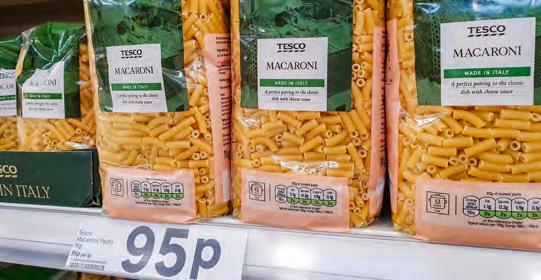
That is another big risk to ponder. Businesses might have a duty to deliver for shareholders,
but they also face a moral obligation to treat their customers fairly.
The ‘S’ in ESG (‘social’) might not ordinarily get the same amount of attention as its two bookends – ‘environmental’ and ‘governance’ – but consumers have long memories, and they will vote with their feet.
That is why there has been so much scrutiny on chief executive pay deals and why shareholders are now prepared to vote against measures they feel are inappropriate when average real wages are failing to keep up with inflation.
There is also a further consideration. Is the practice of even defending margins helping to keep the fire burning under the inflation pyre?
Inflation means higher interest rates – and higher interest rates make servicing debt carried by households and businesses more expensive.
It also makes the ability to raise additional funds for expansion or diversification more difficult and in turn makes UK PLC an ever-ripe target for foreign takeovers.
Yes, investors want the companies that make up their portfolios to make profits but not at any price.
By Danni Hewson Head of Financial Analysis at AJ Bell

invested through drawdown.
If you have a funded defined benefit pension (where the scheme holds assets to pay the promised pensions) and have yet to start receiving an income, you will be entitled to a cash equivalent transfer value.
This is the amount you would receive if you swapped your promised defined benefit pension income for a defined contribution pot of money.
I have a couple of old defined benefit pensions from previous employers. These are deferred as I’m not yet at retirement age. I have noticed on my recent statements the cash equivalent transfer value has dropped significantly (although the payments in retirement remain). Can you please explain how the relationship between interest rates and gilt yields influences pension transfer values? On the basis the yearly amount paid out by these pensions hasn’t diminished, is there any reason to be concerned?
JonathanDefined benefit pensions promise to pay an income for life from a set age (your ‘normal retirement age’) that increases in line with inflation. The starting income is usually based on the number of years you have been a member of the scheme and your salary (either career average or final).
By contrast, defined contribution pensions are a pot of money you build up during your working life, with the responsibility for turning that pot of money into an income in retirement resting with you. This includes having the flexibility to take a retirement income to suit your needs from age 55 (rising to 57 in 2028) while keeping your fund
If you are a member of an unfunded public sector defined benefit pension scheme (where the scheme doesn’t hold any assets, with the promised pensions instead paid out of general taxation), you are not allowed to transfer out.
Your cash equivalent transfer value will be based on the expected cost of providing your pension income. In the jargon, the scheme’s assessment of the value of all defined benefit income promises made to members will make up its liabilities, with investments in assets to pay these liabilities on the other side of the balance sheet.
The difference between assets and liabilities determines whether a defined benefit scheme is in surplus (assets valued higher than liabilities) or deficit (assets valued lower than liabilities).
The cost of providing your pension is closely correlated to movements in UK government gilt yields (i.e., the interest rate on government bonds). This is because defined benefit schemes invest in gilts to pay the incomes they have promised to members.
When yields go down there is less money coming into the scheme to pay its liabilities. Similarly, when gilt yields go up, there is more money coming in to pay out to pensioner members.
That means when gilt yields drop, the scheme needs to use more of its assets to meet its
It’s important to understand the relationship of gilt yields to transfer valuationsTom Selby, AJ Bell Head of Retirement Policy, says:
liabilities. As a result, when gilt yields drop, cash equivalent transfer values offered to members will go up – the scheme can afford to pay more as the cost of you staying in the scheme and it having to provide your benefits is higher. Conversely, when gilt yields rise – as they have recently – the cash equivalent transfer value will drop as less assets need to be used to provide your pension benefits.
None of this affects your entitlement to a retirement income – it’s just the way defined benefit accounting works in relation to liabilities.
For anyone considering transferring a defined benefit pension with a cash equivalent transfer value of £30,000 or more, you will need to take regulated financial advice before transferring.

While I appreciate it might be frustrating to have to take regulated advice before moving your pension, the requirement is in place for a reason.
Defined benefit pensions are extremely
valuable and, although there are circumstances where a transfer can be in someone’s best interests, transferring is a decision that shouldn’t be taken lightly.


If you’re struggling to find an adviser, this Moneyhelper directory is a good place to start. It’s also worth noting that most defined contribution pension providers now require a positive recommendation from your adviser before accepting a defined benefit transfer.
Send an email to asktom@sharesmagazine.co.uk with the words ‘Retirement question’ in the subject line. We’ll do our best to respond in a future edition of Shares

Please note, we only provide information and we do not provide financial advice. If you’re unsure please consult a suitably qualified financial adviser. We cannot comment on individual investment portfolios.

Big decisions to make for those lucky enough to have spare money
The mortgage market is in a state of turmoil, as deals are being regularly withdrawn and replaced with contracts carrying more punitive interest rates. This has been driven by the Bank of England tightening monetary policy, but also more recently some bad inflationary data which has caused the market to raise its expectations for future interest rates. Unfortunately, even if those expectations don’t come to pass, they still affect mortgage pricing in the here and now.
For those with some spare cash to allocate, the question of overpaying a mortgage is a live one. Doing so could make your next remortgage a much less painful experience.


It’s usually a good idea to pay down debt where possible, but savings rates are so high right now, it might tempt some borrowers to stash their cash rather than paying down their mortgage immediately.

The plan involves using the capital and interest accrued in the savings account to reduce debt when you next remortgage.
Whether this is a good idea or not very much depends on the differential between the mortgage rate you’re on, and the cash savings rate you can pick up. For the latter, it’s important to calculate the return you’ll get after tax, to reflect the actual cash return you’ll get in your pocket.
The best fixed-term accounts are offering 5.9% right now if you’re happy to lock up the money for two years. Vanquis Bank, SmartSave and Tandem had the best rates at the time of writing. That amount compares favourably to current mortgage

rates, but looks positively splendid compared to older, less expensive mortgage deals which some people are still enjoying.
For those who are lucky enough to be paying 2% or less on their mortgage, bagging a savings account might be a better idea than paying down the mortgage, because the rate is so much better.
If you use fixed-term accounts to achieve this, it’s vital you ensure the cash will be available by the time you remortgage, rather than still being locked away under the terms of the account.
Tax significantly erodes the benefit of this approach too. A savings rate of 5.9% equates to a post-tax return of 4.72% for a basic-rate taxpayer, 3.54% for a higher-rate taxpayer and 3.24% for an additional-
Should you overpay your mortgage or take advantage of 5.9% rates on cash?
rate taxpayer.
Generally speaking, the higher the tax band you sit in, the more it will make sense to pay down your mortgage rather than using a savings account.

There is some mitigation for the portion of your interest taken by the taxman, in the form of the personal savings allowance.
This allows basic-rate taxpayers to receive £1,000 of interest tax-free. For higher-rate taxpayers this figure is £500, and for additional-rate taxpayers it’s zero.
You can get tax-free interest from a Cash ISA too, though the rates tend to be slightly lower than other savings accounts, and you’re limited to saving £20,000 in each tax year. You would also have to relinquish the ISA wrapper when you withdrew funds to pay down debt at your next remortgage date.
If you decide to use cash funds to pay down your mortgage, you need to watch out for overpayment charges too.
Many mortgages will only allow you to overpay a certain amount each year, often set at a maximum of 10%, though some will be lower.
If you pay back above this amount, you start to rack up large penalty fees, and the whole endeavour becomes uneconomical. So, it’s important that before you start to overpay, you check the terms of your mortgage to make sure you don’t face any such charges and adjust your overpayment amount if you do. You also need to make sure you maintain enough cash for a rainyday fund, so you don’t find yourself caught short.
Mortgages are a relatively cheap way of borrowing, so you should probably attend to any other debt before your mortgage, because it will likely be costing you a whole lot more. This includes personal loans, store cards and credit cards. The average rate charged on credit cards is 20%, significantly more than today’s unforgiving mortgage rates.
By Laith Khalaf AJ Bell Head of Investment Analysis
EDITOR: Daniel Coatsworth @Dan_Coatsworth
DEPUTY EDITOR: Tom Sieber @SharesMagTom

NEWS EDITOR: Steven Frazer @SharesMagSteve
FUNDS AND INVESTMENT
TRUSTS EDITOR: James Crux @SharesMagJames
EDUCATION EDITOR: Martin Gamble @Chilligg
COMPANIES EDITOR: Ian Conway @SharesMagIan
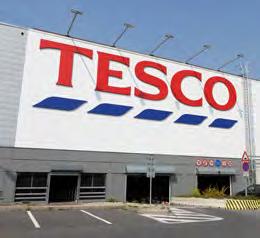
INVESTMENT WRITER: Sabuhi Gard @sharesmagsabuhi
CONTRIBUTORS:
Danni Hewson
Laith Khalaf
Russ Mould
Tom Selby
Laura Suter
Shares magazine is published weekly every Thursday (50 times per year) by AJ Bell Media Limited, 49 Southwark Bridge Road, London, SE1 9HH. Company Registration No: 3733852.
All Shares material is copyright. Reproduction in whole or part is not permitted without written permission from the editor.

Shares publishes information and ideas which are of interest to investors. It does not provide advice in relation to investments or any other financial matters. Comments published in Shares must not be relied upon by readers when they make their investment decisions. Investors who require advice should consult a properly qualified independent adviser. Shares, its staff and AJ Bell Media Limited do not, under any circumstances, accept liability for losses suffered by readers as a result of their investment decisions.
Members of staff of Shares may hold shares in companies mentioned in the magazine. This could create a conflict of interests. Where such a conflict exists it will be disclosed. Shares adheres to a strict code of conduct for reporters, as set out below.
1. In keeping with the existing practice, reporters who intend to write about any securities, derivatives or positions with spread betting organisations that they have an interest in should first clear their writing with the editor. If the editor agrees that the

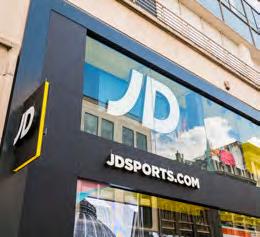
reporter can write about the interest, it should be disclosed to readers at the end of the story. Holdings by third parties including families, trusts, selfselect pension funds, self select ISAs and PEPs and nominee accounts are included in such interests.

2. Reporters will inform the editor on any occasion that they transact shares, derivatives or spread betting positions. This will overcome situations when the interests they are considering might conflict with reports by other writers in the magazine. This notification should be confirmed by e-mail.
3. Reporters are required to hold a full personal interest register. The whereabouts of this register should be revealed to the editor.
4. A reporter should not have made a transaction of shares, derivatives or spread betting positions for 30 days before the publication of an article that mentions such interest. Reporters who have an interest in a company they have written about should not transact the shares within 30 days after the on-sale date of the magazine.
